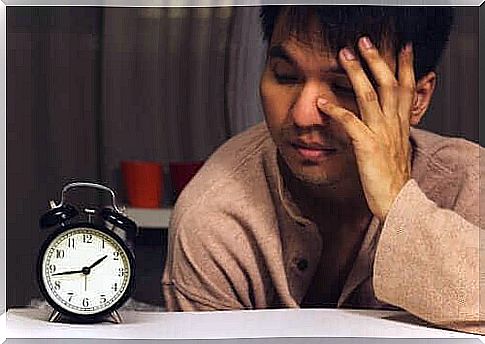Learn All About The Different Types Of Insomnia

If you have tried to be unable to sleep even though you were tired, you have probably suffered from some of the different types of insomnia. Overall, insomnia is one of the most common sleep disorders in the general population.
This disorder consists of a reduced ability to sleep. Typically, it can manifest itself in several ways, resulting in different types of insomnia.
In this article you will learn all about the different kinds of insomnia.
Types of insomnia

In general, doctors classify insomnia as follows, depending on what causes it:
1. Primary
This is when the patient’s insomnia has no clear cause. In general, approx. 10% of the population of this disorder.
This type of insomnia can also be divided into different types, depending on the manifestation and source of the problem:
- Idiopathic insomnia. This comes from childhood. It is typically related to poor sleeping habits.
- Psychophysiological insomnia. This type is characterized by high psychophysiological activation levels associated with sleep onset. In general, the sufferer is very worried about his sleep problems and makes a great effort to try to sleep every night.
Also read: Fight insomnia with these four tips
Types of insomnia: Secondary or comorbid insomnia
This means that the patient’s insomnia has a clear cause. In addition to treating insomnia, medical professionals need to consider its causes, other ailments that the patient suffers from, and even its consequences.
Types of insomnia depending on their duration
1. Transient

First, transient insomnia lasts less than a month. It is the most common and widespread in the population. Often it is associated with stressors that trigger it. Some of these factors can be sudden changes in schedule and family, work, or personal issues.
Typically, the patient usually begins to sleep again when their source of stress disappears.
2. Short-term or acute insomnia
Next, this insomnia lasts between one and three months. Sometimes it is related to stressful life events.
In general, it is situations that make it last longer. These include the loss of a loved one, a breakdown or a serious illness. In addition, the affected person is likely to have to deal with other issues as well, such as anxiety, stress and low mood.
Chronic insomnia is one of the most debilitating types of insomnia
In this case, the patient has prolonged difficulty falling asleep or sleeping. This situation affects their daily functioning.
Generally, this difficulty in falling asleep or enjoying uninterrupted sleep affects them more than three times a week and lasts for at least three months. Unfortunately, those affected not only get too little sleep. They usually also have emotional, mental and physical difficulties during the day.

Types of insomnia: Classification by symptoms
1. Difficulty falling asleep
This typically occurs when people simply have difficulty falling asleep at bedtime. However, this type of insomnia is more common in adolescents. In addition, it is usually associated with medical problems, substance abuse or psychological or psychiatric problems. These include anxiety disorders.
Also read: 3 Unusual Strategies to Fight Insomnia
2. Problems sleeping through
Next, this kind of insomnia is characterized by inability to sleep. The people who suffer from it wake up several times during the night. They may wake up for long periods.
Types of insomnia: You wake up early in the morning
The last type occurs in the morning. It makes the sufferer wake up extra early. Usually the affected person wakes up at least two hours earlier than usual. When this happens, they can not fall asleep again.
This type of insomnia typically accompanies a depressive disorder.
Conclusion on the different types of insomnia
On the whole, it is important to take into account the factors that cause it in order to cope with insomnia. It may be necessary to change inappropriate behaviors and habits. However, you also need to deal with the unhealthy thoughts that worry you and reduce your high emotional activation. If this is the case, therapy can be very helpful.









